- Home
- Quizzes
- My Quiz Activity
- Newsletters
- Sports Betting
- MY FAVORITES
- Add Sports/Teams
- SPORTS
-
NFL
- NFL Home
- Arizona Cardinals
- Atlanta Falcons
- Baltimore Ravens
- Buffalo Bills
- Carolina Panthers
- Chicago Bears
- Cincinnati Bengals
- Cleveland Browns
- Dallas Cowboys
- Denver Broncos
- Detroit Lions
- Green Bay Packers
- Houston Texans
- Indianapolis Colts
- Jacksonville Jaguars
- Kansas City Chiefs
- Las Vegas Raiders
- Los Angeles Chargers
- Los Angeles Rams
- Miami Dolphins
- Minnesota Vikings
- New England Patriots
- New Orleans Saints
- New York Jets
- New York Giants
- Philadelphia Eagles
- Pittsburgh Steelers
- San Francisco 49ers
- Seattle Seahawks
- Tampa Bay Buccaneers
- Tennessee Titans
- Washington Commanders
-
MLB
- MLB Home
- Arizona Diamondbacks
- Atlanta Braves
- Baltimore Orioles
- Boston Red Sox
- Chicago White Sox
- Chicago Cubs
- Cincinnati Reds
- Cleveland Guardians
- Colorado Rockies
- Detroit Tigers
- Houston Astros
- Kansas City Royals
- Los Angeles Angels
- Los Angeles Dodgers
- Miami Marlins
- Milwaukee Brewers
- Minnesota Twins
- New York Yankees
- New York Mets
- Oakland Athletics
- Philadelphia Phillies
- Pittsburgh Pirates
- San Diego Padres
- San Francisco Giants
- Seattle Mariners
- St. Louis Cardinals
- Tampa Bay Rays
- Texas Rangers
- Toronto Blue Jays
- Washington Nationals
-
NBA
- NBA Home
- Atlanta Hawks
- Boston Celtics
- Brooklyn Nets
- Charlotte Hornets
- Chicago Bulls
- Cleveland Cavaliers
- Dallas Mavericks
- Denver Nuggets
- Detroit Pistons
- Golden State Warriors
- Houston Rockets
- Indiana Pacers
- Los Angeles Clippers
- Los Angeles Lakers
- Memphis Grizzlies
- Miami Heat
- Milwaukee Bucks
- Minnesota Timberwolves
- New Orleans Pelicans
- New York Knicks
- Oklahoma City Thunder
- Orlando Magic
- Philadelphia 76ers
- Phoenix Suns
- Portland Trail Blazers
- Sacramento Kings
- San Antonio Spurs
- Toronto Raptors
- Utah Jazz
- Washington Wizards
-
NHL
- NHL Home
- Anaheim Ducks
- Arizona Coyotes
- Boston Bruins
- Buffalo Sabres
- Calgary Flames
- Carolina Hurricanes
- Chicago Blackhawks
- Colorado Avalanche
- Columbus Blue Jackets
- Dallas Stars
- Detroit Red Wings
- Edmonton Oilers
- Florida Panthers
- Los Angeles Kings
- Minnesota Wild
- Montreal Canadiens
- Nashville Predators
- New Jersey Devils
- New York Islanders
- New York Rangers
- Ottawa Senators
- Philadelphia Flyers
- Pittsburgh Penguins
- San Jose Sharks
- Seattle Kraken
- St. Louis Blues
- Tampa Bay Lightning
- Toronto Maple Leafs
- Vancouver Canucks
- Vegas Golden Knights
- Washington Capitals
- Winnipeg Jets
- NCAAF
- NCAAM
- Boxing
- Entertainment
- Lifestyle
- Golf
- MMA
- Soccer
- Tennis
- Wrestling
- More Sports
- RESOURCES
- My Account
- YB on Facebook
- YB on Twitter
- YB on Flipboard
- Contact Us
- Privacy Policy
- Terms of Service

You can debate the merits of what makes for the NBA's regular-season MVP, but come championship time, the series usually determines which player takes home NBA Finals MVP honors.
Here we present every NBA Finals MVP since the award started in 1969. Some of the greatest of the great are on this list because they played their best basketball when it mattered most — with the championship on the line.
2018: Kevin Durant
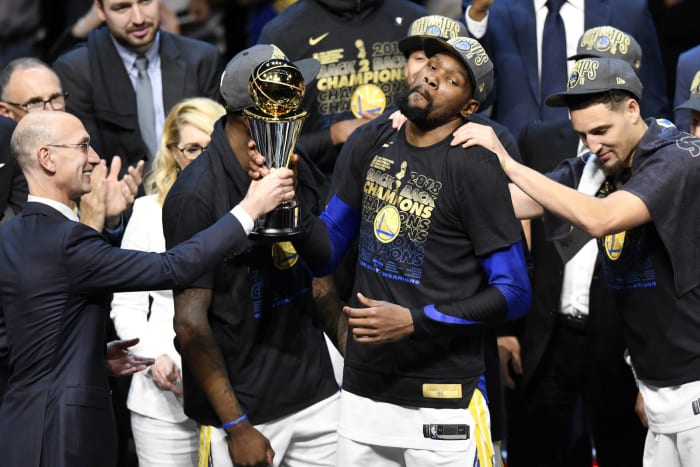
Durant made it back-to-back NBA Finals MVPs, leading the Warriors to a second straight title, this time sweeping LeBron James and the Cleveland Cavaliers. Durant averaged 28.8 points, 10.8 rebounds, 7.5 assists and 2.3 blocks per game, dominating in every facet of the game. In addition he shot 52.6 percent from the field, 40.9 percent from three and 96.3 percent from the line to win his second Finals MVP.
2017: Kevin Durant
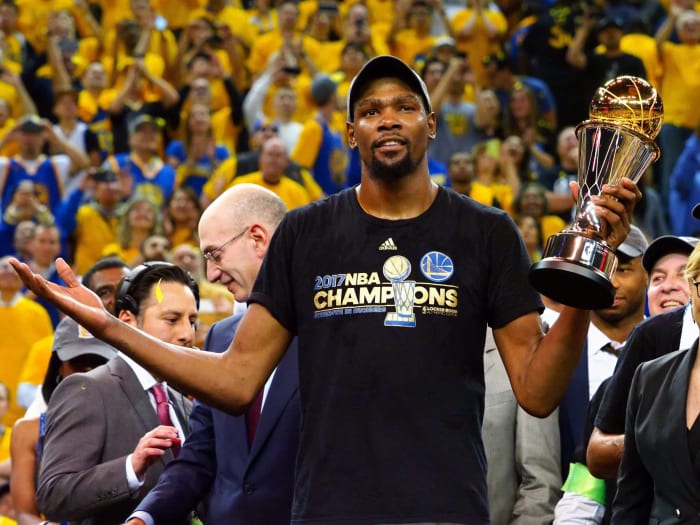
Kevin Durant had accomplished just about everything a player could accomplish individually before the 2016-17 season but had never won an NBA title. That all changed when Durant left Oklahoma City to join the Golden State Warriors. Not only did KD make it to the Finals and win, but he did it by taking hold of the team and earning NBA MVP honors after averaging 35.2 points, 8.2 rebounds, 5.4 assists, 1.6 blocks and a steal in the five games against LeBron James and the Cleveland Cavaliers.
2016: LeBron James
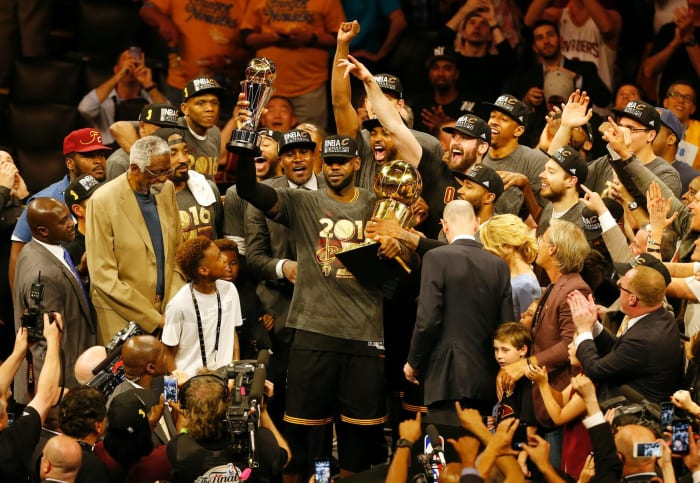
James put the Cavs on his back and did the impossible, bringing a championship home to Cleveland despite being down 3-1 in the series vs. the vaunted Golden State Warriors. James averaged 29.7 points, 11.3 rebounds and 8.9 assists per game during the series, winning his third Finals MVP.
2015: Andre Iguodala

Iguodala wasn't exactly the most likely player on Golden State to win the Finals MVP, but he shined in the Finals. The Warriors were able to take down LeBron James' Cleveland Cavaliers in six games, and Iguodala averaged 16.3 points, 5.8 rebounds and four assists during the series.
2014: Kawhi Leonard
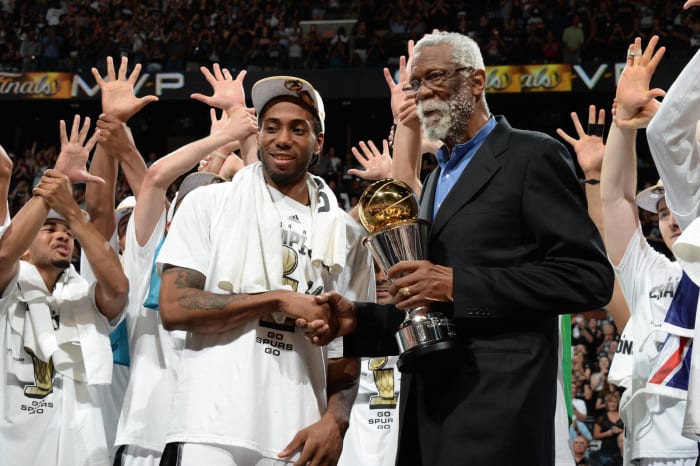
When the San Antonio Spurs rolled through LeBron James and the Miami Heat in just five games in the 2014 Finals, it was an unlikely player who led the way. Third-year small forward Kawhi Leonard simply outplayed his counterpart, James, on both sides of the floor, propelling the Spurs to their fifth title in franchise history. Shooting an incredible 61.2 percent from the field, Leonard was named Finals MVP.
2013: LeBron James

In this dramatic seven-game series, LeBron James and the Miami Heat had just enough in them to take down Tim Duncan and the San Antonio Spurs. James won his second straight Finals MVP Award, averaging 25.3 points, 10.9 rebounds and seven assists over the course of the series.
2012: LeBron James
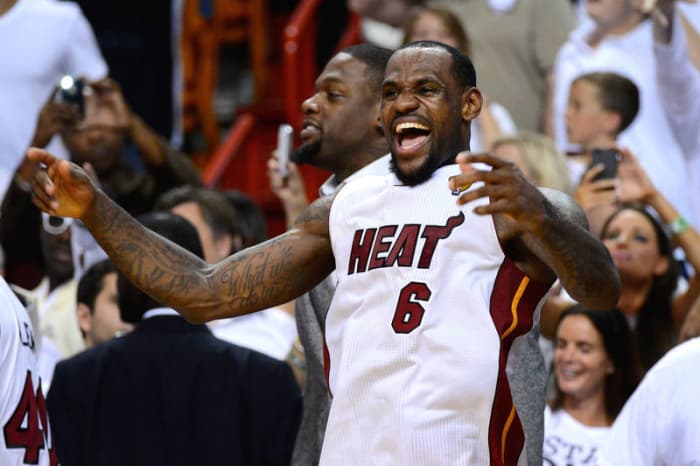
The kid from Akron, Ohio, finally did it. After years middling in Cleveland and a disappointing Finals loss the year before against the Dallas Mavericks, James led the Miami Heat to their second title in franchise history. The first title victory of James’ career, LeBron won Finals MVP as he averaged 28.6 points, 10.2 rebounds and 7.4 assists on 47.2 percent shooting from the field.
2011: Dirk Nowitzki
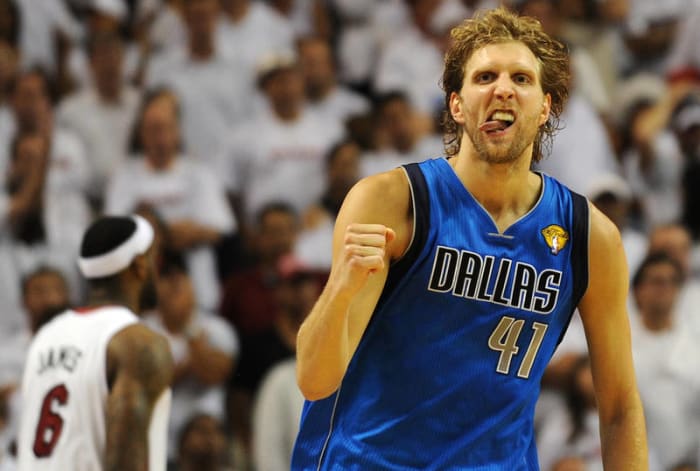
After surprising most by simply making the Finals, Dirk Nowitzki and the Mavericks took it one step further and won it all. The first title in franchise history, it was Nowitzki and his 26.9 points per game that led the way. After defeating the Miami Heat in six games, Nowitzki was named Finals MVP.
2010: Kobe Bryant

In a classic seven-game series against the Boston Celtics, Kobe Bryant and his Los Angeles Lakers pulled off an emotional Game 7 win in front of their home crowd in Los Angeles, becoming back-to-back NBA champions. Bryant was named Finals MVP after averaging more than 28 points per game for the series.
2009: Kobe Bryant

This was vindication for Kobe Bryant. After winning three titles deferring to former teammate Shaquille O’Neal, the Black Mamba finally brought a title to Los Angeles on his terms. Taking down the Orlando Magic in five games, Bryant was named Finals MVP with averages of 32.4 points, 5.6 rebounds and 7.4 assists.
2008: Paul Pierce

Boston was yearning for a title, and Paul Pierce gave it to the city. In their first NBA Finals victory since 1986, Pierce led the Boston Celtics to a Finals victory over the rival Los Angeles Lakers in six games. Pierce, the emotional leader of the 2008 Celtics, was named Finals MVP.
2007: Tony Parker

LeBron James' first trip to the NBA Finals was a short-lived one. Tony Parker and the San Antonio Spurs swept the Cleveland Cavaliers in a series that never once felt close. Parker was named Finals MVP as he averaged more than 24 points per game on 56.8 percent shooting from the field.
2006: Dwyane Wade

The 2006 NBA Finals saw one of the greatest performances in the history of professional sports. Miami guard Dwyane Wade played at a Jordan-esque level, leading the Heat to their first title in franchise history. Incredibly, Wade averaged 34.7 points, 7.8 rebounds, 3.7 assists, 2.7 steals and one block per game. With those absurd numbers, Wade was the only choice possible for Finals MVP.
2005: Tim Duncan

Adding another accolade to his quiet but legendary career, Tim Duncan was named Finals MVP after leading his Spurs to their third title in franchise history, defeating the Detroit Pistons in seven games. Duncan averaged 20.1 points, 14.1 rebounds and 2.1 blocks per game en route to his third Finals MVP Award.
2004: Chauncey Billups

The Lakers had Kobe Bryant, Shaquille O’Neal, Gary Payton and Karl Malone. The Detroit Pistons, however, had a team in the truest sense of the word. In one of the most shocking Finals upsets in NBA history, the Pistons dismantled the Lakers in five games, winning their first title since 1990. Leading the Pistons with 21 points per game, guard Chauncey Billups was named Finals MVP.
2003: Tim Duncan

For San Antonio Spurs legend David Robinson it was his final season, and it ended up being a special one. Officially passing the torch to teammate Tim Duncan, the Spurs won their second title in franchise history, defeating the New Jersey Nets in six games behind Duncan's 24.2 points and 17 rebounds per game.
2002: Shaquille O'Neal

In their third straight and most dominant Finals victory, Shaquille O’Neal nabbed himself his third straight NBA Finals MVP. Sweeping the New Jersey Nets, O’Neal once again dominated, averaging 36.3 points, 12.3 rebounds and 2.8 blocks per game for the series.
2001: Shaquille O'Neal
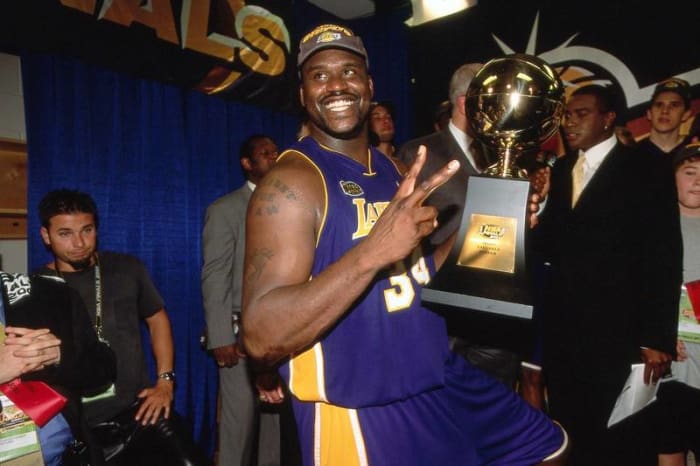
The 2002 Los Angeles Lakers lost a grand total of one playoff game. Let that sink in for moment. After losing Game 1 of the Finals at home to the Philadelphia 76ers, Shaquille O’Neal took over, and the Lakers rattled off four straight victories to win back-to-back NBA titles. O’Neal was named Finals MVP, averaging 33 points, 15.8 rebounds and 3.4 blocks per game.
2000: Shaquille O'Neal

Led by center Shaquille O’Neal, the Los Angeles Lakers won their first title since the Magic Johnson era in 2000. Defeating the Indiana Pacers in six games, O’Neal ruled the series, averaging 38 points and 16.7 rebounds while shooting 61.1 percent from the field. For his efforts, Shaq was crowned Finals MVP.
1999: Tim Duncan

The lockout-shortened season of 1999 saw one of the greatest players in NBA history win his first title of an incredible career. Defeating the New York Knicks in five games, Tim Duncan helped the San Antonio Spurs win their first title in franchise history. At just 22 years old, Duncan won Finals MVP after averaging 27.4 points and 14 rebounds.
1998: Michael Jordan
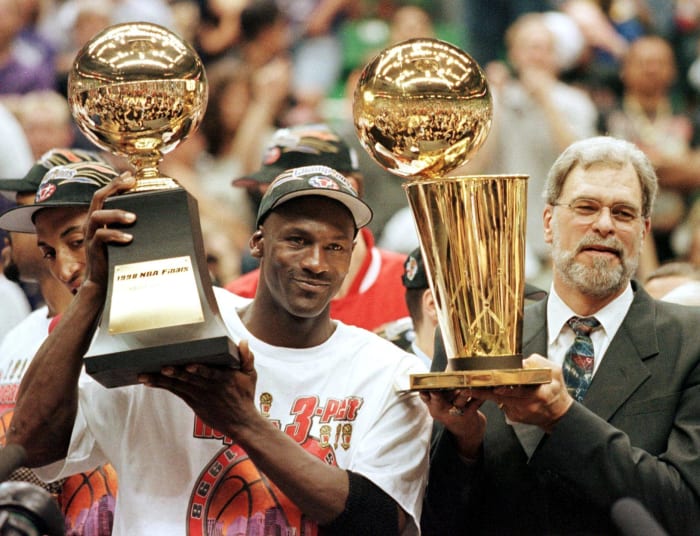
If he hadn’t come back with the Washington Wizards, the 1998 Finals would have been the perfect ending to the greatest career in basketball history. After hitting “the shot,” Michael Jordan brought the Chicago Bulls their sixth title and won his record sixth Finals MVP. Truly though, the final minute of Game 6 in Utah cemented Jordan’s legacy as the greatest player in NBA history.
1997: Michael Jordan

Facing off against Karl Malone, John Stockton and the Utah Jazz, the Chicago Bulls needed every bit of Michael Jordan to win their fifth title in franchise history. Remembered best for his incredible performance in “the flu game,” Jordan willed the Bulls to back-to-back titles. At the end of it all, Jordan won his fifth Finals MVP.
1996: Michael Jordan
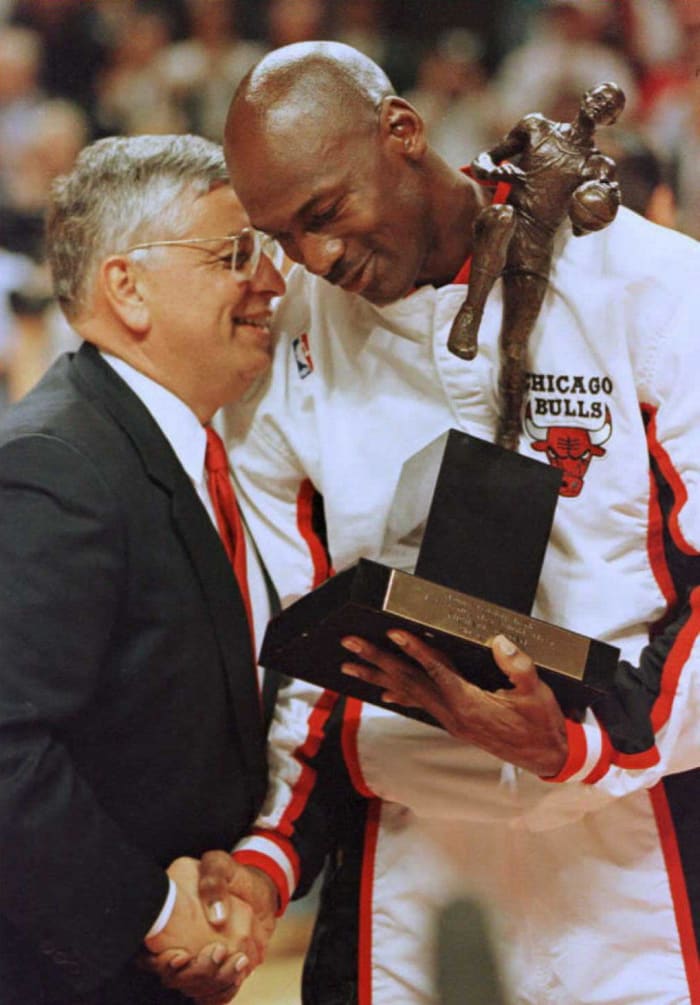
After going 72-10 in the regular season (the greatest single-season record in NBA history at that point), Michael Jordan completed the final step in a unique, emotional journey. Having come back from his retirement, and in the wake of the murder of his father, Jordan won his first title since returning to the NBA. The Bulls defeated the Seattle SuperSonics in six games, and Jordan was named Finals MVP.
1995: Hakeem Olajuwon

The 1995 NBA Finals was supposed to be the first of many championships for Shaquille O’Neal, Penny Hardaway and the Orlando Magic. However, reigning Finals MVP Hakeem Olajuwon stood in their way. After losing Game 1 in heartbreaking fashion to the Rockets, the Magic collapsed. Hakeem and his Rockets swept Orlando, and in the process Olajuwon won his second straight Finals MVP.
1994: Hakeem Olajuwon

Michael Jordan’s stunning retirement left a void to be filled in the NBA. Hakeem Olajuwon and the 1994 Houston Rockets filled it, taking down Patrick Ewing and the Knicks in seven games behind Olajuwon's 26.9 points, 9.1 rebounds and 3.9 blocks per game.
1993: Michael Jordan

After defeating the Phoenix Suns to win his third straight championship and third straight Finals MVP in the process, few could deny then that Michael Jordan was the greatest basketball player on the planet. Jordan averaged an absurd 41 points, 8.5 rebounds and 6.3 assists for the series.
1992: Michael Jordan

It may have gone six games, but did the Portland Trail Blazers ever really stand a chance? Jordan led the Bulls to their second straight Finals victory after averaging over 35 points per game for the series.
1991: Michael Jordan

It would be the first of many. Averaging 31.2 points, 6.6 rebounds and 11.4 assists per game, Michael Jordan and the Chicago Bulls won their first title in franchise history. The Bulls defeated Magic Johnson and the Los Angeles Lakers in six games, and Jordan won the first of his six Finals MVP Awards.
1990: Isiah Thomas

Led by Hall of Fame point guard Isiah Thomas, the Detroit Pistons won back-to-back NBA championships at the conclusion of the 1990 NBA playoffs. Defeating the Portland Trail Blazers in five games, Thomas averaged 27.6 points, 5.2 rebounds and seven assists in the process as the best of the "Bad Boy"-era Pistons.
1989: Joe Dumars

Detroit won its first of two consecutive NBA titles with Hall of Famer Dumars dominating in a four-game sweep of the Lakers. He averaged 27.3 points per game over the four games, adding six assists per game.
1988: James Worthy

The Lakers won their third NBA title in four years, defeating the Pistons in seven games. Worthy had a great all-around series, averaging 22 points, 7.4 rebounds and 4.4 assists per game.
1987: Magic Johnson

Magic and the Lakers took down the rival Celtics in six games. Johnson won his third Finals MVP, averaging 26.2 points, eight rebounds and a whopping 13 assists per game.
1986: Larry Bird

The Celtics defeated Houston in six games behind the heroics of Bird. He averaged 24 points, 9.7 rebounds and 9.5 assists per game for Boston.
1985: Kareem Abdul-Jabbar

Kareem was an unstoppable force in a six-game series win over the Celtics in 1985. The center averaged 25.7 points, nine rebounds and 5.2 assists for the Lakers.
1984: Larry Bird

Bird picked up his first Finals MVP as the Celtics took down the Lakers in seven games. He averaged 27.4 points and 14 rebounds per game in Boston's triumphant victory.
1983: Moses Malone

Malone was a load to stop in the paint for Philadelphia, helping sweep the Lakers in 1983. He put up 25.8 points and 18 rebounds per game during the series.
1982: Magic Johnson

Magic won his second Finals MVP in three years, averaging 16.2 points, 10.8 rebounds and eight assists per game. The Lakers defeated the 76ers in six games.
1981: Cedric Maxwell

Maxwell capped off a great year in his fourth NBA season, helping the Celtics beat the Rockets in six games. He averaged 17.7 points and 9.5 rebounds per game.
1980: Magic Johnson

Magic won his first of three career Finals MVP Awards, as the Lakers beat Philadelphia in six games. He averaged 21.5 points, 11.2 rebounds and 8.7 assists per game.
1979: Dennis Johnson

Seattle defeated Washington in five games to win the 1979 NBA Finals, with Johnson the offensive star. He averaged 22.6 points, six rebounds and six assists per game following an All-Star regular season. The SuperSonics were able to avenge their Finals loss to the Bullets in the previous year.
1978: Wes Unseld

The Bullets edged the SuperSonics in seven games, with Unseld coming up huge in Game 7 and being named series MVP. For the entire series, the Washington center averaged nine points and 11.7 rebounds per game.
1977: Bill Walton

Walton simply couldn't be denied by the 76ers in the paint, as the Trail Blazers won the 1977 Finals in six games. He averaged 18.5 points and 19 rebounds during the six-game series.
1976: Jo Jo White

Boston defeated the Suns in six games to win the 1976 NBA Finals, with White showing off as the offensive star. He averaged 21.7 points per game.
1975: Rick Barry

The sharpshooting Barry helped the Warriors to a sweep of Washington in the 1975 NBA Finals. He put up 29.5 points per game, shooting better than 44 percent from the field for the series.
1974: John Havlicek

Boston edged Milwaukee in seven games, as Havlicek outlasted Kareem Abdul-Jabbar. Havlicek averaged 26.4 points and 7.7 rebounds per game to claim MVP.
1973: Willis Reed

The Knicks overcame the Lakers in five games to win the NBA Finals, with Reed making his presence felt in the paint. He averaged 16.4 points and 9.2 rebounds per game for his second Finals MVP.
1972: Wilt Chamberlain
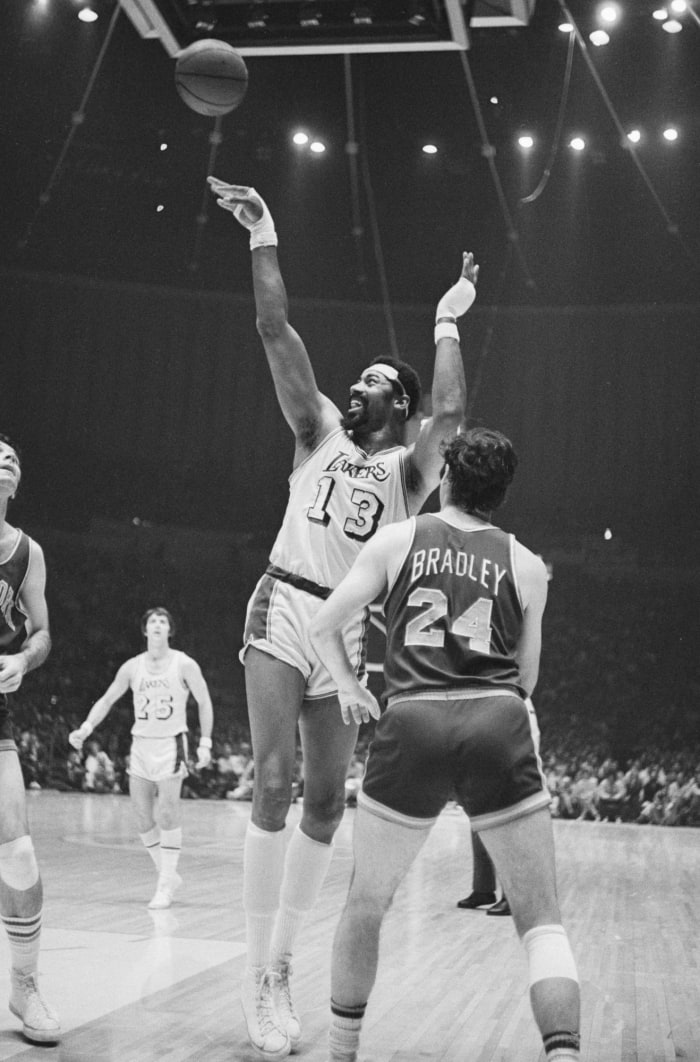
Chamberlain led the Lakers to a five-game Finals win over the Knicks in 1972. The center averaged 19.4 points and 23.2 rebounds in a dominant series performance.
1971: Kareem Abdul-Jabbar

Abdul-Jabbar's Bucks swept the Baltimore Bullets, as the center averaged 27 points and 18.5 rebounds per game.
1970: Willis Reed

New York beat the Lakers in seven games to win the NBA Finals. Reed led all scorers in two of the seven games, finishing the series with 23 points and 10.5 rebounds per game.
1969: Jerry West

West was the first Finals MVP and won it in a losing effort. Despite the Lakers' loss to Boston in seven games, West averaged 37.9 points and 7.4 assists per game for L.A.
Seth Trachtman is a fantasy sports expert and diehard Kansas City Chiefs fan. He doesn't often Tweet, but when he does, you can find him on Twitter @sethroto.
More must-reads:
- Mavericks' Luka Doncic gets payback, knocks out Clippers
- Doc Rivers, Giannis Antetokounmpo contradict each other on star's injury
- The 'Highest career PPG in the playoffs' quiz
Breaking News
Customize Your Newsletter
 +
+
Get the latest news and rumors, customized to your favorite sports and teams. Emailed daily. Always free!
Use of this website (including any and all parts and
components) constitutes your acceptance of these
Terms of Service and Privacy Policy.

